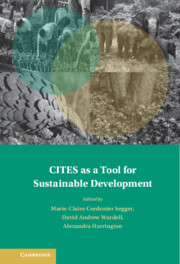Book contents
- CITES as a Tool for Sustainable Development
- Treaty Implementation for Sustainable Development
- CITES as a Tool for Sustainable Development
- Copyright page
- Contents
- Figures
- Tables
- Boxes
- Notes on Contributors
- Preface by CITES Secretary-General, Ivonne Higuero
- Foreword by Honorable Judge Antonio H. Benjamin
- Acknowledgments
- Abbreviations
- Part I Endangered Species, Sustainable Development and the Law
- 1 Introduction
- 2 Origins, Evolution and Contribution of CITES to Achieving Sustainable Development
- 3 Protected Species, Global Commodities and the Law on Sustainable Development
- Part II Sustainable Development in Law and Policy on Endangered Species
- Part III Global Implementation of CITES by Key Species/Commodity
- Part IV National Implementation of CITES
- Part V Emerging Issues and Synergies for CITES in the Context of Sustainable Development
- Part VI Conclusions
- Cases and Court Decisions
- CITES Resolutions and Documents
- Domestic Acts and Regulations
- Multilateral Treaties and Declarations
- Recommended Resources
3 - Protected Species, Global Commodities and the Law on Sustainable Development
from Part I - Endangered Species, Sustainable Development and the Law
Published online by Cambridge University Press: 27 July 2023
- CITES as a Tool for Sustainable Development
- Treaty Implementation for Sustainable Development
- CITES as a Tool for Sustainable Development
- Copyright page
- Contents
- Figures
- Tables
- Boxes
- Notes on Contributors
- Preface by CITES Secretary-General, Ivonne Higuero
- Foreword by Honorable Judge Antonio H. Benjamin
- Acknowledgments
- Abbreviations
- Part I Endangered Species, Sustainable Development and the Law
- 1 Introduction
- 2 Origins, Evolution and Contribution of CITES to Achieving Sustainable Development
- 3 Protected Species, Global Commodities and the Law on Sustainable Development
- Part II Sustainable Development in Law and Policy on Endangered Species
- Part III Global Implementation of CITES by Key Species/Commodity
- Part IV National Implementation of CITES
- Part V Emerging Issues and Synergies for CITES in the Context of Sustainable Development
- Part VI Conclusions
- Cases and Court Decisions
- CITES Resolutions and Documents
- Domestic Acts and Regulations
- Multilateral Treaties and Declarations
- Recommended Resources
Summary
The authors highlight recent law and policy reform innovations across multiple levels of governance, identifying major implementation challenges and achievements and suggesting key areas for additional research, analysis and capacity-building. Further, the authors discuss the regimes which regulate international trade and investment in certain species as commodity value-chains, providing examples of comparisons between non-CITES species versus CITES species. The focus is on analysing regulations that implement the sustainable development provisions of the CITES which affect trade and investment flows, globally. The authors explain value-chains approaches, then discuss endangered species commodity value-chains, including how global trade in species products can be demand driven, and how non-CITES and CITES species can be compared. The authors then present the key concepts in value-chains analysis, explaining the law and governance aspects. These aspects are illustrated with examples of regulatory regimes with national and transnational dimensions, taking into account species highlighted in the rest of the volume. In conclusion, the authors highlight emerging concepts, consider the utility and limitations of a law and governance approach, and its broader linkages to global landscapes governance.
- Type
- Chapter
- Information
- CITES as a Tool for Sustainable Development , pp. 38 - 46Publisher: Cambridge University PressPrint publication year: 2023

